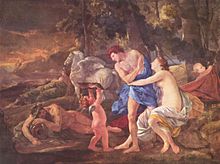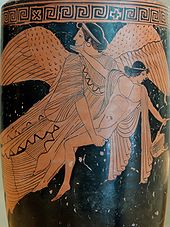- Cephalus
-
Cephalus (Greek: Κέφαλος Kephalos) is an Ancient Greek name, used both for the hero-figure in Greek mythology and carried as a theophoric name by historical persons. The word kephalos is Greek for "head", perhaps used here because Cephalus was the founding "head" of a great family that includes Odysseus. It could be that Cephalus means the head of the sun who kills (evaporates) Procris (dew) with his unerring ray or 'javelin'. Cephalus was one of the lovers of the dawn goddess Eos.
Sumptuous sacrifices for Cephalus and for Procris are required in the inscribed sacred calendar of Thorikos in southern Attica, dating perhaps to the 430s BCE and published from the stone in 1983.[1]
Contents
Cephalus: son of Hermes and Herse
According to pseudo-Apollodorus, Bibliotheke[2] Cephalus was an Athenian, son of Hermes and Herse.
Cephalus: husband of Procris
Cephalus is also made out to be an Aeolian, the son of Deion/Deioneos, ruler of Phocis, and Diomede, and grandson of Aeolus.[3] Athenians further localised the myth by asserting that Cephalus was married to Procris, a daughter of Erechtheus, an ancient founding-figure of Athens.[4] The goddess of dawn, Eos,[5] kidnapped Cephalus when he was hunting. The resistant Cephalus and Eos became lovers, and she bore him a son named Phaëthon (not to be confused with the son of the sun-god Helios). Some sources also give Tithonos and Hesperus as children of Cephalus and Eos. However, Cephalus always pined for Procris, causing a disgruntled Eos to return him to her, making disparaging remarks about his wife's fidelity.
Once reunited with Procris after an interval of eight years, Cephalus tested her by returning from the hunt in disguise, and managing to seduce her. In shame Procris fled to the forest, to hunt with Artemis.[6] In returning and reconciling, Procris brought two magical gifts, an inerrant javelin that never missed its mark, and a hunting hound, Laelaps that always caught its prey. The hound met its end chasing a fox (the Teumessian vixen) which could not be caught; both fox and the hound were turned into stone. But the javelin continued to be used by Cephalus, who was an avid hunter.
Procris then conceived doubts about her husband, who left his bride at the bridal chamber[7] and climbed to a mountaintop[8] and sang a hymn invoking Nephele, "cloud".[9] Procris became convinced that he was serenading a lover. She climbed to where he was to spy on him. Cephalus, hearing a stirring in the brush and thinking the noise came from an animal, threw the never-erring javelin in the direction of the sound – and Procris was impaled. As she lay dying in his arms, she told him "On our wedding vows, please never marry Eos". Cephalus was distraught at the death of his beloved Procris, and went into exile.
The primary literary source for the story is the poet Pherecydes of Athens, preserved in a quoted fragment (Pherecydes Fr. 34) in the so-called "Mythographus Homericus"; a papyrus (PBerolinensis 13282) representing a parallel text based on the same source confirms the details (see Mythographus Homericus)[10].
In a separate episode that is simply an aition explaining the name of Cephallenia and reinforcing its cultural connections with Athens,[11] Cephalus helped Amphitryon of Mycenae in a war against the Taphians and Teleboans. He was awarded with the island of Samos, which thereafter came to be known as Cephallenia. The people who lived on Cephallenia and nearby islands came to be known as Cephallenians.
Cephalus eventually married again, choosing a daughter of Minyas to be his wife. This woman (named Clymene, according to some sources) bore him a son named Arcesius. Arceisius succeeded Cephalus as ruler of his Cephallenian realm. This Arceisius was the grandfather of Odysseus, son of Laertes. Nevertheless, Cephalus never forgave himself over the death of Procris, and he committed suicide by leaping from Cape Leucas into the sea.
The legend is retold in Cephalus and Procris; Narcissus, a 1595 poem by Thomas Edwards. It is echoed in Shakespeare's Midsummer Night's Dream (Act V, scene i), where Pyramus and Thisbe refer to "Shafalus" and "Procrus." While Milton's "the Attic boy" in Il Penseroso is also a reference to Cephalus.[12]
Operatic treatments include Caccini's Il rapimento di Cefalo (c. 1600), André Grétry's Céphale et Procris (1773), and Ernst Krenek's Cefalo e Procri (1934), as well as works by Hidalgo[disambiguation needed
 ] (1660), Elisabeth Jacquet de la Guerre (1694), Krieger[disambiguation needed
] (1660), Elisabeth Jacquet de la Guerre (1694), Krieger[disambiguation needed  ] and others.
] and others.Historical persons named Cephalus
- Cephalus, son of Lysanias from Syracuse (5th c.BC), a wealthy metic and elderly arms manufacturer living in Athens who engages in dialogue with Socrates in Plato's Republic. He was the father of orator Lysias, philosopher Polemarchus and Euthydemus.
- Cephalus, Athenian orator who flourished after the time of Thirty Tyrants.
- Cephalus, a Molossian who sided with Perseus in Third Macedonian War[13].
References
- ^ G. Daux, in L'Antiquité Classique 52 pp 150-74 and J. Paul Getty Museum 12 (1984:145-52); discussed in D. Whitehead, The demes of Attica (1986:194-99), noted by Fowler 1993.
- ^ Bibliotheke, 3.14.3.
- ^ M. Broadbent, Studies in Greek Genealogy 1968, ch. 5.
- ^ E. Kearns, "The heroes of Attica" BICS Supplement 57 (1989):170.
- ^ (Aurora in Roman mythology.
- ^ In the version of Antoninus Liberalis (§41) and Hyginus (Fabula 189), Prokris returns after her sojourn with Artemis and tests her husband disguised as a handsome youth, a late decorative embellishment interpolated to provide a further antithesis.
- ^ "Now the idea that Kephalos left his bride at the bridal chamber itself is a suspiciously particular detail", observes Robert L. Fowler, ("The myth of Kephalos as aition of rain-magic [Pherekydes FrGHist 3F34]", Zeitschrift für Papyrologie und Epigraphik 97 [1993:29–42]. "The detail is there not because the narrative suggests or requires it, but because it was part of a ritual." He remarks other curious details: the return in disguise (masked?), the presentation of a gift, and above all the "summoning of a cloud".
- ^ Ovid specifies the mountaintop as Mount Hymettus; there, R.L. Fowler observes, was a sanctuary of Zeus Ombrios, bringer of rain.
- ^ Fowler 1993 represents this action as the central core of the myth, which he interprets as rain-making magic ritual; Ovid (in Ars Amatoria and also in Metamorphoses) has substituted an invocation of Aura, a cooling breeze.
- ^ for different versions of this story, emphasizing the tragic misunderstanding of Procris, see Procris
- ^ Robert L. Fowler, "The myth of Kephalos as aition of rain-magic (Pherekydes FrGHist 3F34)", Zeitschrift für Papyrologie und Epigraphik 97 (1993:29–42).
- ^ P. Harvey, Oxford Companion to Classical Literature, 1937, s.v. "Cephalus," p. 96.
- ^ Dictionary of Greek and Roman Biography and Mythology [1] by William Smith
External links
Categories:- Greek mythology
- Mythological kings
- Aeolides
- Ancient Greek merchants
- Ancient Syracusians
- Ancient Epirotes
Wikimedia Foundation. 2010.


